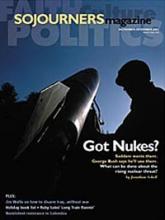"Why Not Attack Iraq?" (by David Cortright, July-August 2002) was thoughtful and well written; however, if we had taken that attitude towards Hitler, most of Europe would be eating wiener schnitzel. How many lives would have been saved had Hitler been stopped in 1936-37? Remember, we only entered World War II because of Pearl Harbor, not because we thought war against Hitler was inevitable. Saddam is adept at using United Nations inspections the way Lucy used to pull the football away from Charlie Brown.
As far as your assertion in premise number one that there exists no casus belli, actually there does. According to the U.N. Special Commission, in the seven years after the end of the Gulf war Iraq played a continuous shell game with inspectors and suspect facilities. The man cannot be trusted. I refer you to U.N. Resolution 687 of April 3, 1991, and all subsequent resolutions. The government of Iraq has been in clear noncompliance for more than 10 years. When Saddam finally has a nuclear device or has successfully weaponized a hemorrhagic fever like Ebola or Marburg in two or three years, do you think he'll suddenly embrace peace? Given his arguably bloodthirsty history, one may be permitted to doubt it.
R. Marro
New York, New York
David Cortright responds:
Saddam Hussein's attempts to develop weapons of mass destruction are indeed a menace, but pre-emptive war is not a legally or morally acceptable means of addressing that threat. U.N. weapons inspections eliminated most of Iraq's weapons program during the 1990s, notwithstanding Saddam's constant deception and obstruction. Our nation's top priority should be to negotiate the return of U.N. inspectors so that they can complete the job of assuring Iraq's disarmament.
Read the Full Article
